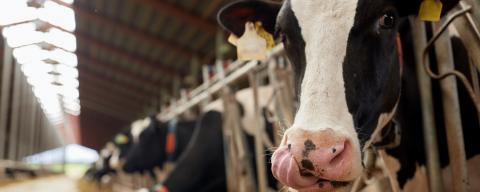Research worldwide has shown that shorter dry periods result in lower colostrum production. Data from New York from 19,000 cows indicated that approximately 12% of cows do not produce colostrum.1 Data from across the US, analyzed at UNH, indicated that about 2.5% of Jerseys do not produce colostrum, and almost 25% do not produce enough colostrum to feed their calves.2 Could the variation in colostrum yields be due to nutritional challenges?
In the last article, we discussed that increasing dry period length increased colostrum yield by close to 1 pound for every 10 days the dry period is lengthened in the late spring, summer, and early fall. In the winter the effect is opposite, but not to the magnitude of the other times of the year, about a 4 oz drop for every 10 days. This could be because the cow is expending more energy to maintain core temperature in the cold months. Therefore, nutrition plays a key role in the production of colostrum. In the large study from New York, several recommendations are given for prepartum cows. Nutrients are provided on a dry matter basis.3
- Starch 18.6 - 22.5%
- Crude Protein 13.6 – 15.5%
- NDF should be fed at current recommendations of at least 35%.
- Minerals should be fed to meet requirements.
A study from Minnesota suggested that including sugar in prepartum diets could improve colostrum yield. The sugar diets contained 6.7% sugar while the control diets contained 3.6% sugar. There was a positive correlation between sugar consumption and colostrum yield.4
There are a few studies indicating that DCAD diets >-7 mEq/100 g are the best, diets lower in DCAD (more negative) have been shown to reduce colostrum yield.5,6
A few experiments have evaluated the supplementation of RPC to prepartum cows.7,8 One study showed that feeding 17.3 grams/day for 17 days did not enhance the yield of colostrum, but increased immunoglobulin G (IgG) by 300 grams/day. In a study from Kansas State University feeding 13.6 grams/day of choline ions as RPC increased colostrum yield by 80% (7.5 pounds vs. 13.9 pounds). The quality of colostrum was the same indicating that total IgG yield was increased.
Research done at UNH indicated that feeding 32 grams/day of unprotected nicotinic acid for 4 weeks prepartum did not affect colostrum yield, but increased IgG yield, likely due to an enhancement of rumen microbial protein synthesis, resulting in more protein flow to the small intestine and hence more amino acids for IgG synthesis. Calves born of cows fed nicotinic acid were more feed efficient.9 In another study at UNH, it was shown that a marker of intestinal development was increased indicating that there was some change in the colostrum components besides IgG that stimulated intestinal development.10
ß-Carotene is a precursor of vitamin A. While research has not shown a benefit of ß-Carotene supplementation on colostrum yield or quality, there may be some benefit to intestinal development of the calf (similar to the nicotinic acid fed calves described above). Calves born of cows fed 700-800 mg of ß-Carotene prepartum were more feed efficient than calves not supplemented with ß-Carotene prepartum.11
To date, there has been limited research evaluating the supplementation of probiotics and enzymes to prepartum cows. However, in one study conducted at UNH, results showed no benefits on colostrum yield or quality.12
Feeding 18.6-22.5% starch and 13.6-15.5% crude protein should be fed to prepartum cows. Feeding sugar might benefit colostrum yield. Not overdoing DCAD diets should be beneficial in maintaining colostrum yield. Regarding additives, feeding rumen-protected choline has been shown to increase colostrum yield while nicotinic acid and ß-Carotene supplementation have not been shown to increase colostrum yield, but feeding nicotinic acid increased colostrum quality and overall IgG yield, and both additives improved feed efficiency in the resultant calves. Probiotic supplementation was not beneficial regarding colostrum yield and quality, but more research needs to be done.
3Westhoff, T.A., T.R. Overton, and S. Mann. 2023a. Epidemiology of bovine colostrum production in New York Holstein herds: Prepartum nutrition and metabolic indicators. J. Dairy Sci. 106:4896-4905.
4Litherland, N., W. Weich, L. Davis, S. Emmanuele, and H. Blaloc. 2011. Nutritional strategies to improve colostrum yield in dairy cattle. Proc. 72nd Minn. Nutr. Conf. 62-63.
5Lopera, C., R. Zimpel, A. Vieira-Neto, F. R. Lopes, W. Ortiz, M. Poindexter, B. N. Faria, M. L. Gambarini, E. Block, C. D. Nelson, and J. E. P. Santos. 2018. Effects of level of dietary cation-anion difference and duration of prepartum feeding on performance and metabolism of dairy cows. J. Dairy Sci. 101:7907–7929.
6Martinez, N., R. M. Rodney, E. Block, L. L. Hernandez, C. D. Nelson, I. J. Lean, and J. E. P. Santos.2018. Effects of prepartum dietary cation-anion difference and source of vitamin D in dairy cows: Lactation performance and energy metabolism. J. Dairy Sci. 101:2544–2562.
7Zenobi, M.G., R. Gardinal, J.E. Zuniga, A.L.G. Dias, C.D. Nelson, J.P. Driver, B.A. Barton, J.E.P. Santos, and C.R. Staples. 2018. Effects of supplementation with ruminally protected choline on performance of multiparous Holstein cows did not depend upon prepartum caloric intake. J. Dairy Sci. 101:1088-1110.
8Swartz, T.H., B.J. Bradford, O. Malysheva, M.A. Caudill, L.K. Mamedova, and K.A. Estes. 2022. Effects of dietary rumen-protected choline supplementation on colostrum yields, quality, and choline metabolites from dairy cattle. JDS Comm. 3:296-300.
9Aragona, K.M., E. M. Rice, M. Engstrom, and P. S. Erickson. 2020. Supplementation of nicotinic acid to prepartum Holstein cows increases colostral immunoglobulin G, excretion of urinary purine derivatives, and feed efficiency in calves. J. Dairy Sci. 103:2287–2302.
10Stahl, T.C., M.C. McBride, K.N. Klobucher, K.R. Johnston, T. Islam, and P.S. Erickson. 2023. Evaluation of colostrum quantity, quality, and bioactive compounds from Jersey cows fed two concentrations of dietary cation-anion difference with or without nicotinic acid and its effect on calf performance. J. Dairy Sci. 106(Suppl. 1): 342. (Abstr.).
11Aragona, K.M., E.M. Rice, M.E. Engstrom, and P.S. Erickson. 2021. Supplementation of β-carotene to prepartum Holstein cows: Effects on colostrum, excretion of urinary purine derivatives, and feed efficiency in calves. J. Dairy Sci. 104:8814-8825.
12Ort, S.B., A. Brito, D. J. Schauff, and P. S. Erickson. 2018. The impact of direct-fed microbials and enzymes on the health and performance of dairy cows with emphasis on colostrum quality and serum immunoglobulin concentrations in calves. J. Anim. Phys. Anim 102: e641-e652.
Dr. Peter Erickson is Professor of Dairy Management and Extension Dairy Specialist at the University of New Hampshire. His primary research area is in the area of optimal colostrum production and management through feeding of the prepartum cow and the newborn calf. He also works in the area of calf and heifer nutrition along with the feeding of alternative feedstuffs.
Dr. Sarah Allen and Dr. Glenda Perreira
Syda Productions / stock.adobe.com 134297507

